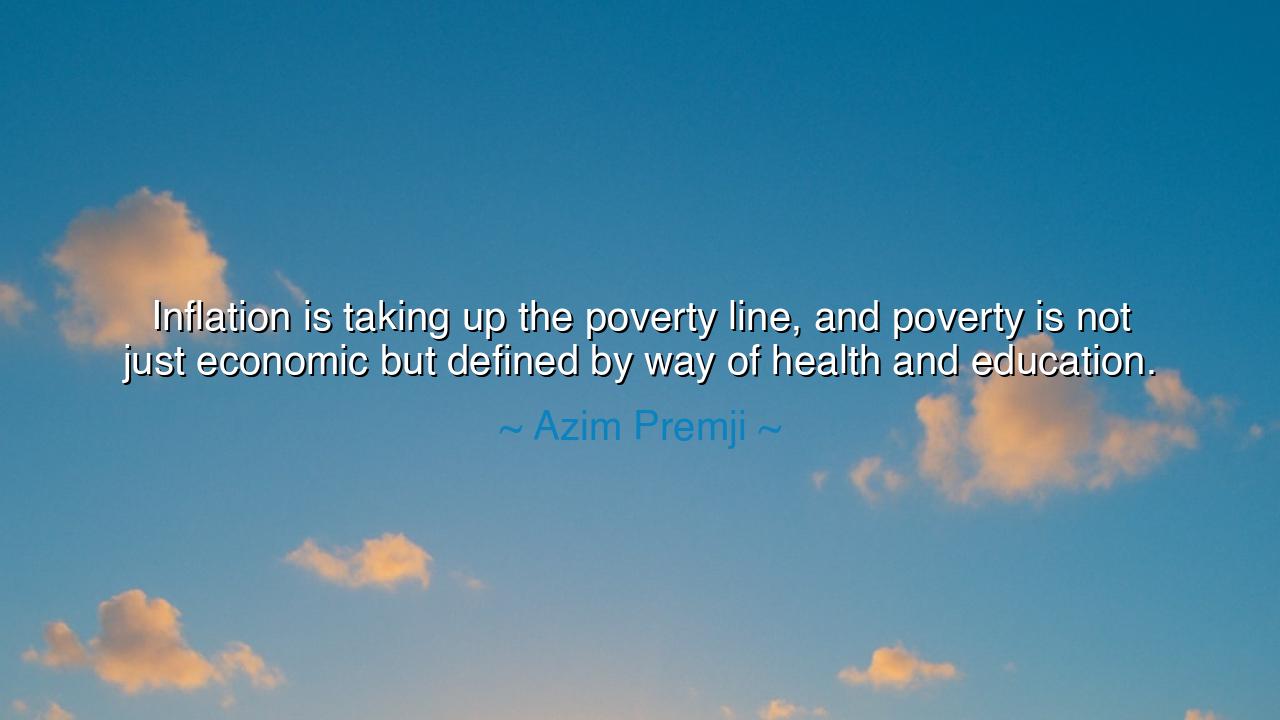
Inflation is taking up the poverty line, and poverty is not just
Inflation is taking up the poverty line, and poverty is not just economic but defined by way of health and education.






“Inflation is taking up the poverty line, and poverty is not just economic but defined by way of health and education.” — thus spoke Azim Premji, the sage of industry and philanthropy, whose vision pierced beyond the numbers of wealth into the soul of society itself. His words are not the language of the marketplace, but the cry of conscience — a reminder that true poverty is not measured by coins, but by the absence of well-being, knowledge, and dignity. For in this age where riches rise like tides for some and vanish like mist for others, he calls us to see that the true measure of progress is not in what we earn, but in what we enable for all.
In his words lies a warning: as inflation climbs, so too does the poverty line — that invisible boundary separating survival from despair. Prices rise, the cost of living grows heavier, and the fragile hopes of the poor are pushed further out of reach. But Premji reminds us that poverty is not merely a lack of money. It is the silent erosion of opportunity — when a child is denied schooling, when a mother cannot afford medicine, when a family’s tomorrow shrinks into fear and uncertainty. These are the deeper hungers of poverty, the kind that no single coin can satisfy.
To understand this truth, we must look to history. In the nineteenth century, when the Industrial Revolution transformed the world, wealth flooded into cities like steel into fire. But amid that splendor, millions lived in squalor — their lungs filled with soot, their children uneducated, their lives shortened by disease. Governments and magnates measured progress in output and profit, blind to the human cost. Yet it was not gold or growth that saved those generations — it was the awakening of social conscience, when reformers like Florence Nightingale and Charles Dickens revealed that prosperity without compassion breeds decay. They showed, as Premji does, that true civilization is measured not by the towers it builds, but by the hearts it uplifts.
When Premji speaks of health and education, he invokes the twin pillars of human flourishing. Health is the foundation — for without strength of body, all ambition withers. Education is the flame — for without the light of understanding, all progress turns to shadow. A nation that neglects either may grow rich for a moment, but will grow hollow in spirit. The poorest man, given knowledge and wellness, can rise to greatness; but the richest, denied these, is poor in all but name. Thus, Premji’s wisdom reaches beyond economics — it is a call to remember the sacred balance between material and moral wealth.
In our modern world, inflation does more than raise prices — it reveals imbalance. When the cost of bread doubles but the worker’s wage remains still, when universities shine with wealth but the village school crumbles, when medicine is sold for profit rather than mercy, the true poverty spreads — unseen but deadly. Premji urges us to see that poverty is not only the absence of possessions, but the absence of fairness, of access, of care. It is the sickness that grows when society forgets its weakest members, when humanity bows before greed.
The lesson, then, is one of action and awareness. Do not measure prosperity by the wealth of a few, but by the well-being of all. Let every act of progress — in business, in governance, in daily life — be guided by compassion. Support education, for it is the weapon that defeats ignorance. Support health, for it is the shield that guards human dignity. And understand that charity alone is not enough — justice must accompany it, so that no man must beg for the rights that should already be his.
So, children of tomorrow, remember this teaching: poverty is not just of the pocket, but of the body and the mind. The rise of inflation is a reminder that prosperity must be guarded not by wealth alone, but by wisdom. Heal the sick, teach the unlearned, and stand beside those who falter — for the strength of a nation lies not in the power of its currency, but in the wholeness of its people. And when all are lifted, when no one is left behind, then we shall truly say we are rich — not in gold, but in grace.






AAdministratorAdministrator
Welcome, honored guests. Please leave a comment, we will respond soon